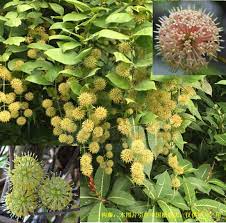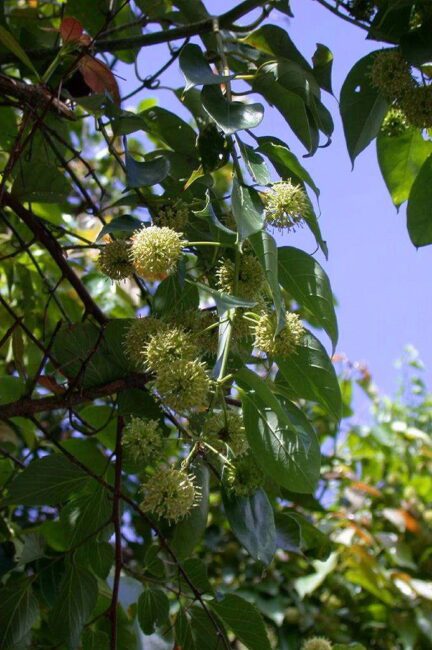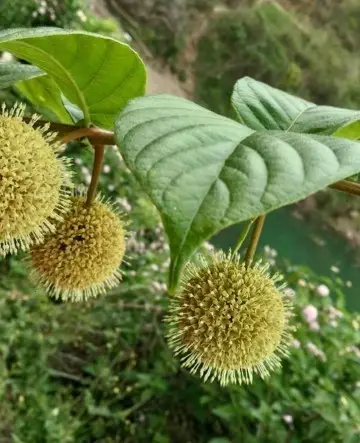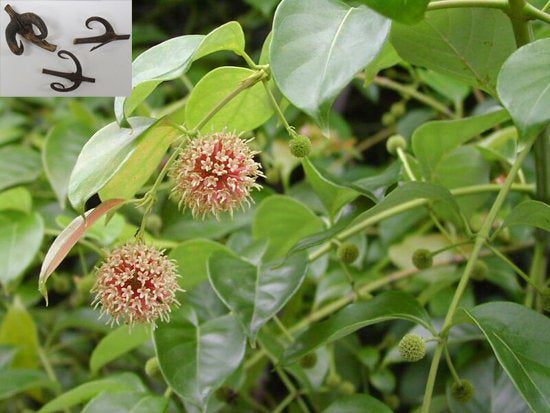Uncaria rhynchophylla, commonly known as Cat’s Claw or Gou Teng in traditional Chinese medicine, is a woody vine native to China, Japan, and other parts of Southeast Asia. Belonging to the Rubiaceae family, it has been used for centuries in traditional medicine for its various health benefits.
Cat’s Claw is characterized by its hooked thorns, which resemble the claws of a cat, hence its name. The vine produces small, yellowish-white flowers and small, elongated fruits. It typically grows in forests and thickets, clinging to trees and other vegetation for support.
In traditional Chinese medicine, Uncaria rhynchophylla is valued for its neuroprotective, sedative, and anticonvulsant properties. It is commonly used to treat conditions such as hypertension, insomnia, anxiety, and convulsions. Cat’s Claw is believed to have a calming effect on the nervous system, helping to reduce stress and promote relaxation.
Modern scientific research has begun to investigate the potential health benefits of Cat’s Claw and its bioactive compounds, particularly alkaloids such as rhynchophylline and isorhynchophylline. These compounds have shown promising results in preclinical studies for their neuroprotective, anti-inflammatory, and antioxidant effects.
Cat’s Claw is typically prepared as a decoction, tea, tincture, or extract for internal use. It can also be used topically in the form of creams or ointments to alleviate skin conditions such as eczema and psoriasis.
While Cat’s Claw is generally considered safe for most individuals when used as directed, it is essential to consult with a qualified healthcare professional before incorporating it into your wellness routine, especially if you have underlying health conditions or are taking medications.
Uncaria rhynchophylla, or Cat’s Claw, is a valuable medicinal plant with a long history of use in traditional medicine. Its neuroprotective and calming properties make it a popular remedy for various nervous system disorders, and ongoing research continues to explore its potential therapeutic applications.
The Botanical Description of Uncaria rhynchophylla
1. Leaves: The leaves of Uncaria rhynchophylla are opposite and elliptic in shape, with a leathery texture. They typically measure around 5 to 10 centimeters in length and 2 to 4 centimeters in width.
2. Flowers: Uncaria rhynchophylla produces small, greenish-yellow flowers with five petals. These flowers are borne in clusters and bloom during the summer months.
3. Fruits: The fruits of Uncaria rhynchophylla are small and fleshy, with a red color when ripe. They contain seeds and are consumed by various wildlife species.
4. Stem: The stem of Uncaria rhynchophylla is woody and often climbs or trails along other vegetation for support. It may reach lengths of several meters.
5. Bark: The bark of Uncaria rhynchophylla is grayish-brown in color and becomes deeply furrowed with age. It is used in traditional medicine for its therapeutic properties.
6. Roots: The roots of Uncaria rhynchophylla are fibrous and spread extensively underground. They anchor the plant and absorb nutrients and water from the soil.
7. Growth Habit: Uncaria rhynchophylla is a perennial woody vine that thrives in tropical and subtropical climates. It has a sprawling growth habit and can form dense thickets in its native habitat.
8. Trichomes: Uncaria rhynchophylla possesses small trichomes on its leaves and stems, which serve various functions including protection against herbivores and reducing water loss.
9. Vascular System: The vascular system of Uncaria rhynchophylla consists of xylem and phloem tissues that transport water, nutrients, and sugars throughout the plant.
10. Reproductive Organs: Uncaria rhynchophylla reproduces sexually through the production of seeds contained within its fruits. It may also propagate vegetatively through stem cuttings.
11. Adaptations: Uncaria rhynchophylla has adapted to its environment by developing climbing stems and producing secondary metabolites with pharmacological properties.
12. Habitat: Uncaria rhynchophylla is commonly found in forests, along riverbanks, and in disturbed areas throughout East Asia, including China, Japan, and Korea.
The Geographic Distribution of Uncaria rhynchophylla

1. China: Uncaria rhynchophylla is native to several provinces in southern and central China, where it occurs in forests and mountainous regions.
2. Japan: In Japan, Uncaria rhynchophylla is found in various parts of the country, including Honshu, Kyushu, and Shikoku islands, where it grows in forests and woodlands.
3. Korea: Uncaria rhynchophylla is distributed in South Korea, particularly in the southern regions, where it inhabits deciduous forests and river valleys.
4. Taiwan: This species is also present in Taiwan, where it occurs in mountainous areas and is utilized in traditional Chinese medicine.
5. Vietnam: Uncaria rhynchophylla has been reported in northern Vietnam, where it grows in subtropical forests and is valued for its medicinal properties.
6. Thailand: In Thailand, Uncaria rhynchophylla is found in the northern and western regions, where it is known locally as “Ma Ti Lian” and used in traditional herbal remedies.
7. Laos: Uncaria rhynchophylla is documented in Laos, where it inhabits evergreen and mixed deciduous forests, contributing to the local biodiversity.
8. Cambodia: This species occurs in Cambodia, where it is found in forests and woodlands, playing a role in the ecosystem as a food source for wildlife.
9. Myanmar: Uncaria rhynchophylla has been recorded in Myanmar, where it grows in forested areas and may have cultural significance in traditional practices.
10. Malaysia: In Malaysia, Uncaria rhynchophylla is reported in the northern states, where it grows in lowland and hill forests, often alongside other medicinal plants.
11. India: There are also reports of Uncaria rhynchophylla in northeastern India, where it is part of the rich botanical diversity of the region, although its distribution may be localized.
The Chemical Composition of Uncaria rhynchophylla
1. Alkaloids: Uncaria rhynchophylla contains various alkaloids, including rhynchophylline, isorhynchophylline, corynoxeine, and hirsutine, which contribute to its pharmacological effects.
2. Flavonoids: Flavonoids such as quercetin, kaempferol, and rutin are present in Uncaria rhynchophylla and exhibit antioxidant and anti-inflammatory properties.
3. Triterpenes: Uncaria rhynchophylla contains triterpenes, including ursolic acid and oleanolic acid, which have demonstrated potential therapeutic benefits, including anti-cancer effects.
4. Phenolic Compounds: Phenolic compounds like chlorogenic acid and caffeic acid are found in Uncaria rhynchophylla and contribute to its antioxidant activity and neuroprotective effects.
5. Tannins: Tannins are present in Uncaria rhynchophylla and may contribute to its astringent taste and potential medicinal properties, such as antimicrobial and wound-healing effects.
6. Essential Oils: Uncaria rhynchophylla produces essential oils containing compounds such as limonene, linalool, and α-pinene, which may have aromatic and therapeutic properties.
7. Glycosides: Certain glycosides have been identified in Uncaria rhynchophylla, including arabinosides and glucosides, which may contribute to its bioactivity and traditional uses.
8. Saponins: Uncaria rhynchophylla contains saponins, which are glycosides with detergent-like properties and potential health benefits, including cholesterol-lowering effects.
9. Polysaccharides: Polysaccharides extracted from Uncaria rhynchophylla have been studied for their immunomodulatory effects and potential applications in functional foods and supplements.
10. Amino Acids: Uncaria rhynchophylla contains various amino acids, including proline, arginine, and lysine, which are essential for protein synthesis and other physiological processes.
11. Lignans: Some lignans have been identified in Uncaria rhynchophylla, although their significance and potential biological activities require further investigation.
12. Sterols: Sterols such as β-sitosterol and stigmasterol are present in Uncaria rhynchophylla and may contribute to its pharmacological effects, including anti-inflammatory properties.
13. Carotenoids: Carotenoids, including β-carotene and lutein, are present in Uncaria rhynchophylla and contribute to its antioxidant activity and potential health benefits.
14. Minerals: Uncaria rhynchophylla contains various minerals, including calcium, magnesium, and potassium, which are essential for maintaining cellular function and overall health.
Read Also: Chiggers: Description, Damages Caused, Control and Preventive Measures
The Medicinal Health Benefits Of Uncaria rhynchophylla (Cat’s Claw)

1. Anti-Inflammatory: Uncaria rhynchophylla exhibits potent anti-inflammatory properties, which can help reduce inflammation associated with conditions such as arthritis, rheumatism, and inflammatory bowel disease.
2. Antioxidant: The antioxidant compounds found in Uncaria rhynchophylla help neutralize harmful free radicals in the body, protecting cells from oxidative damage and lowering the risk of chronic diseases such as cancer and cardiovascular disorders.
3. Neuroprotective: Uncaria rhynchophylla has neuroprotective effects, supporting brain health and cognitive function. It may help prevent neurodegenerative diseases like Alzheimer’s and Parkinson’s by reducing oxidative stress and inflammation in the brain.
4. Immune Modulation: Compounds in Uncaria rhynchophylla have been shown to modulate the immune system, enhancing its ability to fight off infections and diseases while maintaining immune balance and reducing autoimmune reactions.
5. Cardiovascular Support: Uncaria rhynchophylla may support cardiovascular health by lowering blood pressure, reducing cholesterol levels, and improving blood flow. These effects can help prevent heart disease and stroke.
6. Antimicrobial: Some constituents of Uncaria rhynchophylla exhibit antimicrobial properties, inhibiting the growth of bacteria, viruses, fungi, and parasites. This can help prevent and treat infections, including respiratory infections and gastrointestinal illnesses.
7. Analgesic: Uncaria rhynchophylla has analgesic properties, relieving pain and discomfort associated with various conditions such as headaches, menstrual cramps, and neuropathic pain. It may offer a natural alternative to conventional pain medications.
8. Anticancer: Studies suggest that Uncaria rhynchophylla may possess anticancer properties, inhibiting the growth and spread of cancer cells and promoting apoptosis (cell death) in tumors. Further research is needed to explore its potential as a cancer treatment.
9. Antidiabetic: Uncaria rhynchophylla may help regulate blood sugar levels and improve insulin sensitivity, making it beneficial for individuals with diabetes or those at risk of developing the disease.
10. Gastrointestinal Health: Uncaria rhynchophylla has been used traditionally to support digestive health and alleviate gastrointestinal disorders such as ulcers, gastritis, and irritable bowel syndrome (IBS). It may help reduce inflammation and promote healing of the digestive tract.
11. Stress Reduction: Compounds in Uncaria rhynchophylla have been shown to have adaptogenic properties, helping the body adapt to stress and reduce the negative effects of chronic stress on physical and mental health.
12. Antianxiety and Antidepressant: Uncaria rhynchophylla may have anxiolytic and antidepressant effects, helping alleviate symptoms of anxiety, depression, and mood disorders by modulating neurotransmitter levels and promoting relaxation.
13. Liver Protection: Studies suggest that Uncaria rhynchophylla may protect the liver from damage caused by toxins, alcohol, and medications, supporting liver function and detoxification processes.
14. Bone Health: Uncaria rhynchophylla contains minerals and other nutrients that support bone health and may help prevent osteoporosis and bone fractures, especially in postmenopausal women.
15. Skin Health: Uncaria rhynchophylla extracts have been studied for their potential benefits in promoting skin health, including anti-aging effects, wound healing, and protection against UV-induced damage.
16. Respiratory Support: Uncaria rhynchophylla may help alleviate respiratory conditions such as asthma, bronchitis, and allergies by reducing inflammation and improving lung function. It may also help relieve coughs and congestion.
The Methods of Usage to Achieve the Provided Health Benefits Of Uncaria rhynchophylla (Cat’s Claw)
1. Herbal Tea: Prepare a decoction or infusion of Uncaria rhynchophylla leaves or bark to make a soothing herbal tea. Drink it regularly to enjoy its medicinal benefits for overall health and well-being.
2. Tincture: Extract the active compounds of Uncaria rhynchophylla using alcohol or glycerin to create a concentrated tincture. Take it orally by adding a few drops to water or juice, following the recommended dosage.
3. Capsules or Tablets: Uncaria rhynchophylla supplements are available in capsule or tablet form, providing a convenient way to consume standardized doses of the herb for specific health concerns.
4. Powder: Uncaria rhynchophylla powder can be mixed into smoothies, yogurt, or other foods for easy consumption. It allows for flexible dosing and can be incorporated into daily wellness routines.
5. Topical Applications: Prepare a topical ointment or cream containing Uncaria rhynchophylla extracts for skin conditions or joint pain relief. Apply it directly to the affected area as needed.
6. Traditional Formulations: Explore traditional herbal preparations and recipes that include Uncaria rhynchophylla as a key ingredient. These formulations may have been used for centuries to address various health issues.
7. Culinary Use: Incorporate Uncaria rhynchophylla leaves or bark into cooking or baking recipes for added flavor and potential health benefits. Experiment with different culinary applications to enjoy its medicinal properties.
8. Poultice: Prepare a poultice using mashed Uncaria rhynchophylla leaves or bark mixed with water or other ingredients. Apply it to wounds, bruises, or inflamed areas to promote healing and reduce pain.
9. Steam Inhalation: Add Uncaria rhynchophylla leaves or extracts to hot water and inhale the steam to relieve respiratory congestion, sinusitis, or other upper respiratory tract infections.
10. Bath Soak: Add Uncaria rhynchophylla infusion or extract to bathwater for a relaxing and therapeutic soak. It can help soothe sore muscles, reduce stress, and promote overall relaxation.
11. Mouthwash: Prepare a mouthwash or gargle solution using Uncaria rhynchophylla extracts to promote oral health, reduce inflammation, and prevent infections in the mouth and throat.
12. Compress: Soak a cloth or bandage in Uncaria rhynchophylla infusion or decoction and apply it as a warm or cold compress to painful or inflamed areas of the body for relief and healing.
The Side Effects Of Using Uncaria rhynchophylla Medicinal Plant
1. Gastrointestinal Upset: Some individuals may experience gastrointestinal side effects such as nausea, vomiting, diarrhea, or stomach cramps when consuming Uncaria rhynchophylla supplements or extracts.
2. Allergic Reactions: In rare cases, allergic reactions to Uncaria rhynchophylla may occur, resulting in symptoms like skin rash, itching, swelling, or difficulty breathing. Discontinue use and seek medical attention if allergic symptoms develop.
3. Blood Pressure Changes: Uncaria rhynchophylla may affect blood pressure levels, potentially causing hypotension (low blood pressure) or hypertension (high blood pressure) in sensitive individuals. Monitor blood pressure regularly, especially if you have hypertension.
4. Drug Interactions: Uncaria rhynchophylla may interact with certain medications, including anticoagulants, antiplatelet drugs, blood pressure medications, and immunosuppressants. Consult a healthcare professional before combining Uncaria rhynchophylla with prescription medications.
5. Pregnancy and Breastfeeding: Pregnant and breastfeeding women should avoid Uncaria rhynchophylla due to insufficient safety data. There is a lack of research on its effects during pregnancy and lactation, so it’s best to err on the side of caution.
6. Autoimmune Disorders: Individuals with autoimmune disorders such as multiple sclerosis, lupus, or rheumatoid arthritis should use Uncaria rhynchophylla with caution, as it may stimulate the immune system and exacerbate autoimmune symptoms.
7. Surgery: Uncaria rhynchophylla may have blood-thinning effects and could increase the risk of bleeding during or after surgery. Discontinue use at least two weeks before scheduled surgery to minimize this risk and inform your healthcare provider.
8. Central Nervous System Effects: Some individuals may experience dizziness, drowsiness, or headache when taking Uncaria rhynchophylla supplements, especially at higher doses. Use caution when operating machinery or driving.
9. Liver Toxicity: Although rare, there have been reports of liver toxicity associated with Uncaria rhynchophylla supplements. Monitor liver function tests if using the herb long-term or at high doses, and discontinue use if signs of liver damage occur.
10. Kidney Function: Individuals with kidney disease or impaired kidney function should use Uncaria rhynchophylla with caution, as the herb may affect kidney function or interact with medications used to treat kidney conditions.
11. Hormonal Effects: Uncaria rhynchophylla may have hormonal effects in the body, potentially impacting hormone-sensitive conditions such as breast cancer, endometriosis, or uterine fibroids. Consult a healthcare provider if you have concerns about hormonal balance.
12. Skin Sensitivity: Some individuals may experience skin sensitivity or photosensitivity when using Uncaria rhynchophylla topically or consuming high doses internally. Protect exposed skin from sunlight and discontinue use if skin irritation occurs.
13. Psychological Effects: In rare cases, Uncaria rhynchophylla may cause changes in mood, anxiety, or hallucinations, particularly in sensitive individuals or at higher doses. Discontinue use if psychiatric symptoms develop and seek medical attention.
14. Dental Health: Prolonged or excessive use of Uncaria rhynchophylla may lead to tooth discoloration or enamel erosion due to its tannin content. Practice good oral hygiene and consider limiting consumption if dental issues arise.
Read Also: Scrapie in Sheep and Goats: Description, Damages Caused, Control and Preventive Measures
The Scientific Research and Studies of Uncaria rhynchophylla (Cat’s Claw)

1. Anti-Inflammatory Activity: Studies have demonstrated the anti-inflammatory effects of Uncaria rhynchophylla, attributing its therapeutic potential to compounds like rhynchophylline and isorhynchophylline, which inhibit pro-inflammatory cytokines and enzymes.
2. Neuroprotective Effects: Research suggests that Uncaria rhynchophylla may protect against neurodegenerative diseases by modulating neurotransmitter levels, reducing oxidative stress, and promoting neuronal survival and regeneration.
3. Antioxidant Properties: Uncaria rhynchophylla exhibits antioxidant activity, scavenging free radicals and protecting cells from oxidative damage, which may contribute to its anti-aging and disease-preventive effects.
4. Cardiovascular Benefits: Animal studies have shown that Uncaria rhynchophylla extracts can lower blood pressure, improve endothelial function, and reduce cholesterol levels, suggesting potential cardiovascular protective effects.
5. Anticancer Potential: In vitro and animal studies have indicated that Uncaria rhynchophylla extracts may inhibit cancer cell proliferation, induce apoptosis, and suppress tumor growth in various cancer types, warranting further investigation.
6. Immunomodulatory Effects: Uncaria rhynchophylla has been found to modulate immune responses, enhancing immune function and reducing inflammation, which may have implications for autoimmune disorders and infectious diseases.
The Safety Precautions and Recommendations In Using Uncaria rhynchophylla (Cat’s Claw) Medicinal Plant
1. Consult Healthcare Professional: Before using Uncaria rhynchophylla supplements or extracts, especially if you have underlying health conditions, are pregnant or breastfeeding, or are taking medications, consult a qualified healthcare professional for personalized advice.
2. Start with Low Doses: Begin with low doses of Uncaria rhynchophylla and gradually increase as tolerated to minimize the risk of side effects and assess individual sensitivity.
3. Monitor for Adverse Reactions: Pay attention to any adverse reactions or changes in health status when using Uncaria rhynchophylla, and discontinue use if unexpected symptoms occur. Seek medical attention if necessary.
4. Quality and Purity: Choose reputable brands and products that adhere to quality standards and undergo rigorous testing for purity, potency, and safety. Look for standardized extracts with verified active ingredients.
5. Follow Recommended Dosage: Adhere to recommended dosage guidelines provided by the manufacturer or healthcare professional to ensure safe and effective use of Uncaria rhynchophylla supplements.
6. Consider Drug Interactions: Be aware of potential drug interactions with Uncaria rhynchophylla, especially if you are taking medications for blood pressure, blood clotting, immune disorders, or other health conditions. Discuss any concerns with your healthcare provider.
7. Monitor Liver Function: If using Uncaria rhynchophylla long-term or at high doses, consider periodic monitoring of liver function tests to detect any signs of liver toxicity or adverse effects on hepatic function.
8. Discontinue Before Surgery: Discontinue use of Uncaria rhynchophylla at least two weeks before scheduled surgery to reduce the risk of bleeding complications and inform your healthcare provider about herbal supplement use.
9. Keep Out of Reach of Children: Store Uncaria rhynchophylla supplements safely out of reach of children and pets to prevent accidental ingestion or misuse.
10. Report Adverse Events: Report any adverse events or side effects associated with Uncaria rhynchophylla to the appropriate regulatory authorities or healthcare professionals to contribute to ongoing safety monitoring and research.
FAQs About Uncaria rhynchophylla (Cat’s Claw) Medicinal Plant
1. What is Uncaria rhynchophylla?
Uncaria rhynchophylla, commonly known as Cat’s Claw, is a medicinal plant native to East Asia. It has been used in traditional medicine for centuries due to its potential health benefits.
2. What are the main medicinal properties of Uncaria rhynchophylla?
Uncaria rhynchophylla exhibits a wide range of medicinal properties, including anti-inflammatory, antioxidant, neuroprotective, immune-modulating, and cardiovascular-supportive effects.
3. How is Uncaria rhynchophylla typically consumed?
Uncaria rhynchophylla can be consumed in various forms, including herbal teas, tinctures, capsules, tablets, powders, topical ointments, and culinary preparations. The choice of consumption method depends on individual preferences and health goals.
4. What health conditions can Uncaria rhynchophylla help with?
Uncaria rhynchophylla may help with various health conditions, including inflammation, arthritis, neurodegenerative diseases, cardiovascular disorders, immune dysfunction, gastrointestinal issues, and skin problems, among others.
5. Are there any side effects associated with Uncaria rhynchophylla?
While Uncaria rhynchophylla is generally considered safe for most people when used appropriately, some individuals may experience side effects such as gastrointestinal upset, allergic reactions, changes in blood pressure, and interactions with medications. It’s essential to use caution and consult a healthcare professional if concerned.
6. Can Uncaria rhynchophylla interact with medications?
Yes, Uncaria rhynchophylla may interact with certain medications, including anticoagulants, antiplatelet drugs, blood pressure medications, immunosuppressants, and others. It’s important to discuss any potential drug interactions with a healthcare provider before using Uncaria rhynchophylla supplements.
7. Is Uncaria rhynchophylla safe during pregnancy and breastfeeding?
Pregnant and breastfeeding women should avoid Uncaria rhynchophylla due to limited safety data. It’s best to err on the side of caution and refrain from using herbal supplements during pregnancy and lactation unless under the guidance of a qualified healthcare professional.
8. How should Uncaria rhynchophylla be stored?
Uncaria rhynchophylla supplements should be stored in a cool, dry place away from direct sunlight and moisture. It’s essential to follow the storage instructions provided by the manufacturer to maintain product quality and potency.
9. Can Uncaria rhynchophylla be used for children?
The use of Uncaria rhynchophylla supplements in children should be approached with caution and under the guidance of a healthcare professional. Dosage recommendations may vary based on the child’s age, weight, and health status.
10. Where can I purchase high-quality Uncaria rhynchophylla supplements?
High-quality Uncaria rhynchophylla supplements can be purchased from reputable health food stores, pharmacies, online retailers, and herbal medicine practitioners. It’s important to choose products from trusted brands that adhere to quality standards and undergo testing for purity and potency.






